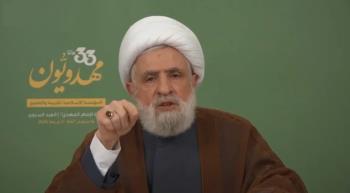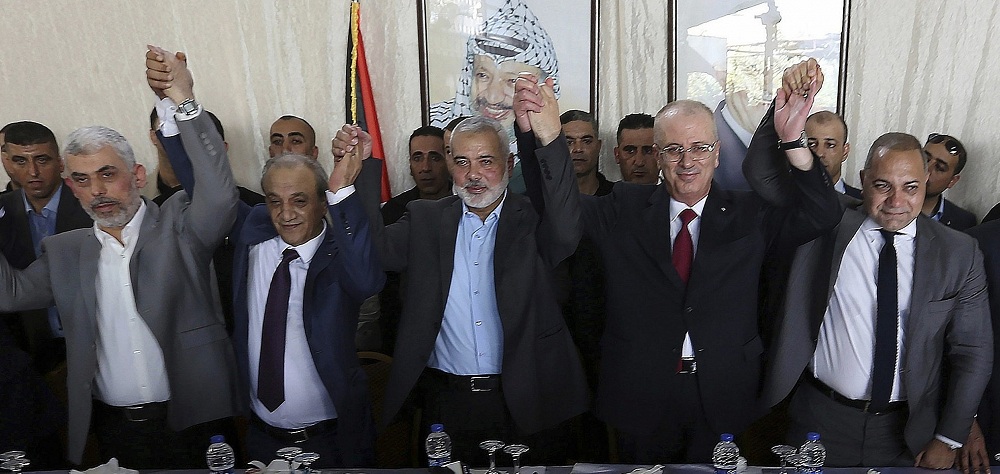Alwaght- Recently, Palestinian groups managed to hold reconciliation talks in Lebanon and then Turkey. The meetings come on the heels of Arab compromising measures marked by the UAE and Bahrain’s normalization of ties with the Israeli regime and are meant to mobilize national sources to counter the Israeli occupational policy.
Alwaght has talked to Masayeb Naeemi, an expert of Lebanese and Palestinian affairs, asking him to shed light on the aspects of the recent Palestinian summits.
Commenting on the meetings that brought together Hamas and Fattah, Mr Naeemi said that the new developments show that the Palestinian groups, both jihadi and political groups in Hamas and Fattah, have felt that their separation and disunity only caused enemy’s abuses, leaving the situation end up against their interests.
“When the Israelis and Emiratis publicized their secret relations under the normalization deal, the Palestinian Authority embarked on a new realism that developed new mindset for unity among West Bank groups and Gaza-based political and jihadi groups. The recent visit to Lebanon of Hamas’s Ismail Haniyeh provided a good opportunity. In Beirut, the jihadi leaders, Supreme Democratic Council, and other factions that were separate from resistance agenda gathered together and discussed reunion. ”
He continued that Turkey meetings were held for the groups and figures who had limitations attending Lebanon meetings, and this shows that a new vision on the Palestinian side at national levels is in the making, though there are some concerns that Tel Aviv agents may infiltrate the negotiations and highlight the sticking points between the two sides. “All in all, the outlook is clear and positive and there can hope of Palestinian differences being settled.”
Asked about the significance of unity among the Palestinian groups, Mr Naeemi held that Palestine is three parts. One part is Gaza which is united and unoccupied. The other part is the occupied West Bank. And the third part is the pre-1948 occupied regions that are now home to Israeli settlements and whose Arab residents are considered Israeli citizens though they have never enjoyed rights equal to Jewish citizens.
He continued: “The Oslo agreements create for the Palestinians a mirage of restoration of part of their lands. After 30 years, not only this Palestinian wish was not realized but also the Israeli occupation widened. On the other side, in some Arab countries, the American ambassadors have been tasked with negotiations to prepare the ground for Palestinian migration to these Arab countries, signaling that a substantial conspiracy is in the works. Therefore, the Palestinian leaders began to conclude that continuation of the current tense situation can only lead to obliteration of the Palestinian future.”
Mr Naeemi held that the Palestinian groups at home pursue unity presently and abroad the Palestinian refugees in Lebanon, Syria, Egypt, and Jordan have considerable influence. Intra-Palestinian unity can give serious headache to the Israeli leaders and policy makers. Currently, some 4 to 5 million Palestinians live in refugee camps and a lot of others live in the Western and other world countries. If the unity finds its way to birth, Palestine’s equations will change despite some political differences and Tel Aviv will have nothing in hand to do.
He was asked for his comment on the last month Arab-Israeli normalization agreement. He answered that the Israeli regime seizes the opportunity of having Trump favor— and also the crises the UAE is living— to strike normalization deals with Arab countries. The relations with Arab states already existed secretly and Arab economic assistance has been passed to the Israeli regime via the US. The significance of the publicization of the Arab-Israeli relations is the impact it could have on the Palestinian morale and the frustration it could create among them. The Israeli side knows that it is the Palestinians that at the end of the road can liberate their country. Although foreign help is important, if the Palestinian morale is weakened, it would be very dangerous and end up in Tel Aviv’s favor.
“If the Palestinians unite, the Israeli regime cannot resist their push for liberation, no matter how strong it is. Egypt has relations with the Israeli regime, but the Egyptians tend to support the Palestinians. This is also true in Jordan. Israeli tourists do not feel secure in Egypt and Jordan. So, these relations with Tel Aviv are not decisive. Just against the Israeli expectations, publicization of relations with the Persian Gulf Arab states only has awakened the Palestinians. Now Mahmoud Abbas and other Fattah leaders perceive the importance of unity and perception of this importance can restore Palestinians’ hope for return.”
Mr Naeemi was also asked to have his say on the hosting of Intra-Palestinian negotiations by Lebanon and Turkey. He noted that as the equations change and some Arab countries’ treason is revealed, the mediators change. For example, in the past Saudi Arabia hosted Palestinian talks in Mecca. But neither Saudi Arabia nor other states have been successful in ending the Palestinian fragmentation as they only tried to bury the Palestinian cause. Egypt proved not better than Saudi Arabia. Despite sharing borders with Gaza Strip and pro-Palestinians tendency among the Egyptians, Cairo played a role in Israeli-imposed siege, demonstrating insignificance of the Palestinian cause for pro-Western leaders. Although Turkey says he has no role in the negotiations, Beirut and Ankara would provide new platforms to the Intra-Palestinian talks. After all, the nature of the Arab world has changed and Saudi Arabia and the UAE are now on the Israeli side. The compromising countries have no place among the Palestinian groups.



























